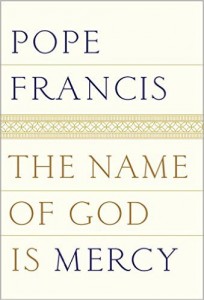“The Pope is a man who needs the mercy of God,” the leader of the world’s 1.2 billion Catholics says in a new book-length interview with seasoned Vatican reporter Andrea Tornielli.
The book, titled The Name of God is Mercy, is an exploration of the Pope’s extraordinary jubilee Holy Year of Mercy, which kicked off on December 8, 2015. A jubilee happens once every 25 years.
Mercy is Pope Francis’ cornerstone value, and his papal motto – miserando atque eligendo – translates as ‘choosing through mercy’. The publisher, Piemme, released excerpts of the book, ahead of its official release date.
Pope Francis repeatedly insists in the book that mercy is the very essence of God: “Jesus said he came not for those who were good but for the sinners. He did not come for the healthy, who do not need the doctor, but for the sick. For this reason, we can say that mercy is God’s identity card. God of Mercy, merciful God. For me, this really is the Lord’s identity.”
He goes on to speak of his own need for mercy, saying, “I said it sincerely to the prisoners of Palmasola, in Bolivia, to those men and women who welcomed me so warmly. I reminded them that even Saint Peter and Saint Paul had been prisoners. I have a special relationship with people in prisons, deprived of their freedom. I have always been very attached to them, precisely because of my awareness of being a sinner.
“Every time I go through the gates into a prison to celebrate Mass or for a visit, I always think: why them and not me? I should be here. I deserve to be here. Their fall could have been mine. I do not feel superior to the people who stand before me. And so I repeat and pray: why him and not me? It might seem shocking, but I derive consolation from Peter: he betrayed Jesus, and even so he was chosen.”
“What might Peter have said to the Messiah upon his resurrection from the tomb? Might he have said that he felt like a sinner? He must have thought of his betrayal, of what had happened a few days earlier when he pretended three times not to recognise Jesus in the courtyard of the High Priest’s house. He must have thought of his bitter and public tears.
“If Peter did all of that, if the gospels describe his sin and denials to us, and if despite all this Jesus said [to him], ‘tend my sheep’ (John 21), I don’t think we should be surprised if his successors describe themselves as sinners. It is nothing new.”
Pope Francis speaks about mercy in a more general sense, saying, “The Church condemns sin because it has to relay the truth: ‘this is a sin’. But at the same time, it embraces the sinner who recognises himself as such, it welcomes him, it speaks to him of the infinite mercy of God. Jesus forgave even those who crucified and scorned him.
“To follow the way of the Lord, the Church is called on to dispense its mercy over all those who recognise themselves as sinners, who assume responsibility for the evil they have committed, and who feel in need of forgiveness. The Church does not exist to condemn people, but to bring about an encounter with the visceral love of God’s mercy.
“I often say that in order for this to happen, it is necessary to go out: to go out from the churches and the parishes, to go outside and look for people where they live, where they suffer, and where they hope. I like to use the image of a field hospital to describe this ‘Church that goes forth’. It exists where there is combat. It is not a solid structure with all the equipment where people go to receive treatment for both small and large infirmities. It is a mobile structure that offers first aid and immediate care, so that its soldiers do not die.
“It is a place for urgent care, not a place to see a specialist. I hope that the Jubilee [The Holy Year of Mercy] will serve to reveal the Church’s deeply maternal and merciful side, a Church that goes forth toward those who are ‘wounded,’ who are in need of an attentive ear, understanding, forgiveness, and love.”
The Name of God is Mercy was officially released on Tuesday 12 January in 86 countries around the world.
Image: US Papal Visit on Flickr | CC License
Email This Story
Why not send this to a friend?


